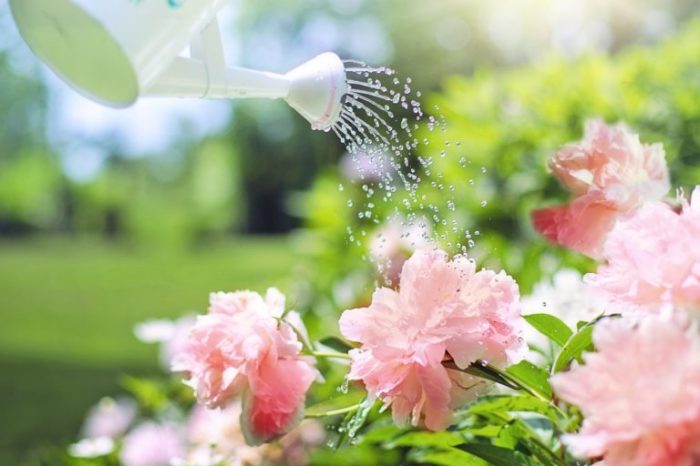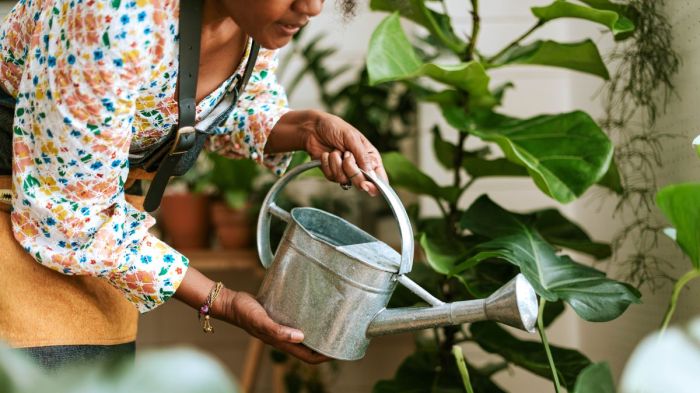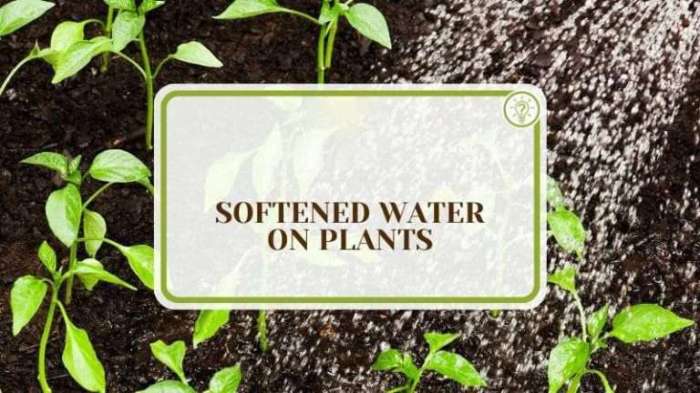Will Water from a Water Softener Kill Plants?
Water Softener Salt and its Effects on Plants: Will Water From A Water Softener Kill Plants

Source: greenerideal.com
Will water from a water softener kill plants – Using softened water to irrigate plants can have both positive and negative consequences. While softened water removes minerals that can cause scale buildup in pipes and appliances, it also significantly alters the mineral balance in the water, potentially impacting plant health. Understanding the composition of softened water and its effects on plants is crucial for responsible gardening.
Water Softener Salt Composition and its Effects on Plants

Source: futurecdn.net
Typical water softener salt primarily consists of sodium chloride (NaCl), common table salt. The process of water softening involves ion exchange, where calcium and magnesium ions (which cause hardness) are replaced with sodium ions. This results in water with a high concentration of sodium and chloride ions.
High concentrations of sodium and chloride ions can disrupt plant cell function. These ions can interfere with nutrient uptake, leading to deficiencies. Additionally, the high concentration of these ions creates osmotic stress. Osmotic stress occurs when the concentration of salts in the soil solution is higher than the concentration of salts within the plant cells. This causes water to move out of the plant cells and into the soil, leading to wilting and dehydration.
The severity of this stress varies depending on the plant species, with some being more tolerant than others. For example, salt-tolerant plants like succulents may withstand higher concentrations of sodium chloride than more sensitive plants like ferns or azaleas.
Impact of Water Hardness on Plant Health
Essential minerals like calcium and magnesium play vital roles in plant growth and development. Calcium is crucial for cell wall structure and membrane function, while magnesium is a central component of chlorophyll, essential for photosynthesis. Hard water, containing higher concentrations of these minerals, differs significantly from softened water, which is depleted of them. While hard water can provide these essential nutrients, excessive amounts can also lead to nutrient imbalances.
Many plants thrive in hard water environments, while others are highly sensitive to it. For instance, some drought-tolerant plants, like lavender, benefit from the mineral content of hard water. Conversely, acid-loving plants like rhododendrons and azaleas may struggle in high-mineral conditions. The ideal mineral balance varies considerably across different plant species.
| Mineral | Hard Water Concentration (ppm) | Softened Water Concentration (ppm) | Effect on Plant Growth |
|---|---|---|---|
| Calcium (Ca) | 50-200+ | <5 | Essential for cell wall structure; deficiency leads to stunted growth and weak stems. |
| Magnesium (Mg) | 20-80+ | <5 | Central component of chlorophyll; deficiency causes chlorosis (yellowing of leaves). |
| Sodium (Na) | <10 | 100+ | High levels can lead to osmotic stress, wilting, and nutrient imbalances. |
| Chloride (Cl) | <10 | 100+ | High levels contribute to osmotic stress and can damage plant tissues. |
Methods of Watering Plants with Softened Water, Will water from a water softener kill plants

Source: plantamerica.com
To mitigate the negative effects of softened water, several strategies can be employed. Diluting softened water with regular tap water or rainwater reduces the concentration of sodium and chloride ions, lessening the osmotic stress on plants. A carefully planned watering schedule prevents the accumulation of salts in the soil. Regular monitoring of soil salinity levels is crucial to assess the effectiveness of watering strategies and adjust as needed.
The watering frequency should be adjusted based on the plant type and soil conditions. Well-draining soil reduces the risk of salt buildup, while clay soils require less frequent watering to prevent over-saturation and salt accumulation. Plants with high water requirements, like leafy greens, may need more frequent, diluted watering compared to drought-tolerant plants.
While the high salt content in water softener discharge can harm some plants, the effect varies. Understanding the specific needs of your plants is crucial, which ties into knowing when to water them effectively, especially if you’re dealing with weeds – check out this guide on when to water a weed plant for more information. Therefore, whether softened water will kill your plants depends on their salt tolerance and watering frequency.
Visual Representations of Softened Water’s Effects
Plants watered exclusively with softened water may exhibit several visual changes indicating salt damage. Leaf discoloration, often starting with yellowing or browning of leaf margins, is a common symptom. Wilting, even with adequate moisture in the soil, can occur due to the osmotic stress preventing water uptake. The plant’s overall vigor is diminished, with stunted growth and weaker stems.
A healthy plant displays vibrant green leaves, strong stems, and robust overall growth. The roots are typically white or light-colored, firm, and extensively branched. In contrast, a plant suffering from salt damage exhibits wilted, discolored leaves, brittle stems, and stunted growth. The roots are often brown, mushy, and exhibit reduced branching.
Alternative Watering Solutions for Plants
Rainwater and distilled water offer excellent alternatives for sensitive plants. These water sources lack the high sodium and chloride concentrations of softened water, minimizing the risk of salt stress. Other readily available alternatives include collected greywater (after appropriate filtration and treatment) and well water (depending on its mineral composition). The cost-effectiveness of these alternatives varies, with rainwater being the most economical option.
Soil amendments like gypsum can help mitigate the negative effects of softened water. Gypsum improves soil structure and helps to leach out excess sodium, reducing salinity levels. Regular soil testing and appropriate adjustments to watering practices, coupled with careful plant selection, are key to successful gardening even with softened water.
FAQ Corner
Can I use softened water on all plants?
No, some plants are more sensitive to high sodium levels than others. Always research the specific needs of your plants.
How can I test my soil for salt buildup?
Soil testing kits are readily available at garden centers and online. They measure the electrical conductivity (EC) of the soil, indicating salt levels.
Is rainwater a good alternative to softened water?
Yes, rainwater is an excellent alternative as it is naturally soft and contains beneficial minerals. Collect it responsibly.
What are some soil amendments that help mitigate salt damage?
Adding gypsum to the soil can help improve drainage and reduce sodium levels. Consult a local expert for specific recommendations.




















